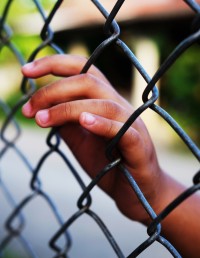Lawsuits, Policy Work Highlight NCYL's Efforts To Stop Criminalization Of Students
The National Center for Youth Law, aligned with its mission to shut down the school-to-prison pipeline, is a leader in the fight to stop the criminalization of youth and end punitive responses to children in schools.
Students, particularly students of color and those with disabilities, frequently face criminal prosecution and/or are denied services for which they are entitled, often due to exhibiting age or developmentally-appropriate behaviors. Primarily through litigation, administrative complaints, and policy advocacy, NCYL has attacked these insidious practices, which can have wide-ranging and devastating impacts on youth.
Here are some of the ways that NCYL has stepped up to protect and defend the rights of students and their families:
In the courtroom
NCYL has represented plaintiffs in several landmark lawsuits and administrative complaints — including in Texas, California, and Connecticut — that helped expose inequities and bring about positive systemic change.
In 2013, NCYL, in conjunction with Texas Appleseed and Disability Rights Texas, filed a federal administrative civil rights complaint against Dallas County, Texas, and four of its local school districts. The complaint contended that the defendants’ use of criminal courts to prosecute youth for truancy amounted to “cruel and unusual punishment” in violation of students’ constitutional rights.
The complaint also alleged that the four districts employed “inconsistent and inflexible” attendance policies and practices that violate the civil rights of students with disabilities and limited English proficiency.
Among the troubling cases cited in the complaint against Dallas County and its schools, which at the time were pursuing truancy cases in adult court at more than twice the rate of the other 49 states combined:
- An eighth grader who missed school with the flu and received a truancy charge after she did not turn in a doctor’s note on time;
- A student with learning disabilities and depression who must still attend monthly truancy court hearings after graduating from high school and remains at risk of jail time until her more than $1,100 in fines are paid;
- A student who was told by her doctor to stay home for a month following complications from childbirth but was charged with truancy after the school refused to accept her doctor’s note.
The complaint was part of a strategy that, in 2015, led to Texas adopting House Bill 2398, which requires schools to take steps to address students’ truancy before referring them to court. The new law made truancy a civil offense so students are no longer subject to fines and criminal records in truancy court proceedings, although judges will still be able to order students to counseling or tutoring.
Additionally, schools are prohibited from referring a student to court for truancy if the truancy is the result of pregnancy, being in the state foster program, homelessness, or being the principal income earner for the student’s family. Further, truancy courts are required to dismiss cases when they determine that a student does not have the capacity to participate in court due to mental illness.
NCYL’s litigation work in this area also includes:
- A 2015 lawsuit — Alicia B. v. Malloy — filed in Connecticut that challenged the inadequate education of expelled students in the state. NCYL, along with the Center for Children’s Advocacy and K&L Gates LLP, represented two Black middle school students who effectively received no education during their expulsions, despite their right to education established by the Connecticut State Constitution. The suit was settled in 2018. As a result of the litigation, Connecticut passed legislation requiring that expelled students be educated in accordance with standards developed to ensure they can access education in a meaningful way. The settlement also requires that the state issue guidance to school districts; provide resources on reducing expulsions to districts, families and the community; and monitor and address racial disparities in expulsions.
- A 2019 settlement agreement, stemming from a lawsuit — Sigma Beta XI v. County of Riverside — that charged the Youth Accountability Team program in California’s Riverside County with treating thousands of youth like hardened criminals for minor adolescent behaviors. The suit led to widespread reforms. Among the terms of the settlement: the county will no longer enroll youth in its probation program — with its oppressive tactics, such as surprise searches, unannounced home visitations, restrictions and interrogations — for adolescent, non-criminal behavior such as talking back to school officials, truancy, or academic problems; and the county will appoint counsel for all youth who may enter its diversion program.
Through policy development
NCYL has also been actively involved in the development of legislation to address these unjust practices. These efforts include NCYL’s work on California Senate Bills 395 and 203, laws that aim to protect children’s rights:
- SB 395 (2017): Prohibits police from interrogating youth younger than 16 until the youth has had a chance to speak with an attorney about their rights. Counsel must explain the Miranda rights to the youth and what it means to waive them.
- SB 203 (2020): Expands MIranda rights protections by requiring all youth younger than 18 to consult with an attorney before waiving their constitutional rights during a custodial interrogation.
Both these laws represent welcome change. By ensuring youth understand their rights, we ensure the outcomes of these police interrogations are just and lawful, and create greater trust, accountability, and due process for all.
To support these changes, NCYL prepared implementation guides — with information about Miranda rights and California law — to distribute to youth, law enforcement officers, and educators throughout the state.
NCYL is proud to help lead the fight to end the criminalization of youth and weaken the school-to-prison pipeline.






